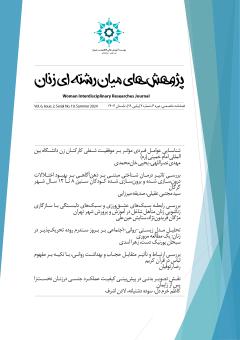بررسی تاثیر درمان شناختی مبتنی بر ذهن آگاهی بر بهبود اختلالات درون سازی شده و برون سازی شده کودکان سنین 8 تا 12 سال شهر گرگان
محورهای موضوعی :
سید مجتبی عقیلی
1
![]() ,
صدیقه میرزایی
2
,
صدیقه میرزایی
2
![]()
1 - استادیار، دانشگاه پیام نور، تهران، ایران.
2 - کارشناس ارشد روانشناسی، دانشگاه پیام نور، گرگان، ایران.
کلید واژه: درمان شناختی مبتنی بر ذهن آگاهی, اختلالات درون سازی شده و برون سازی شده, کودکان.,
چکیده مقاله :
این پژوهش با هدف بررسی تأثیر درمان شناختی مبتنی بر ذهن¬آگاهی بر بهبود اختلالات درون¬سازی شده و برون¬سازی شده کودکان سنین 8 تا 12 سال شهر گرگان انجام شد. روش پژوهش اثربخشی از نوع پیشآزمون_پسآزمون با گروه کنترل است. جامعه مورد مطالعه کلیه دانش آموزان سنین 8 تا 12 سال ساکن شهر گرگان بودند. حجم نمونه در نرمافزار Stata برابر با 44 نمونه (22 نفر در هر گروه) تعیین شد. ابزار پژوهش پرسشنامه اختلالهای رفتاري آخنباخ بود. گروه آزمایش درمان شناختی مبتنی بر ذهن¬آگاهی را در 8 جلسه 60 دقیقهای دریافت کردند، اما گروه کنترل تا پایان پژوهش مداخلهای دریافت نکرد. جهت تجزیهوتحلیل دادهها از شاخصهای توصیفی و تحلیل واریانس یک متغیره توسط نرمافزار SPSS استفاده شد. یافتهها نشان داد که درمان شناختی مبتنی بر ذهن¬آگاهی بر بهبود اختلالات درون¬سازی شده و برون¬سازی شده کودکان سنین 8 تا 12 سال اثربخش است (05/0>p). نتایج حاکی از آن است که درمان شناختی مبتنی بر ذهن¬آگاهی منجر به کاهش اختلالات درون¬سازی شده و برون¬سازی شده کودکان سنین 8 تا 12 سال میشود.
This research was conducted with the aim of investigating the effect of cognitive therapy based on mindfulness on the improvement of internalized and externalized disorders of children aged 8 to 12 years in Gorgan city. The effectiveness research method is pre-test-post-test with control group. The studied population were all students aged 8 to 12 years living in Gorgan city. The sample size in Stata software was determined equal to 44 samples (22 people in each group). The research tool was the Achenbach Behavioral Disorders Questionnaire. The experimental group received cognitive therapy based on mindfulness in 8 sessions of 60 minutes, but the control group did not receive any intervention until the end of the study. In order to analyze the data, descriptive indices and univariate analysis of variance were used by SPSS software. The findings showed that cognitive therapy based on mindfulness is effective in improving internalized and externalized disorders of children aged 8 to 12 years (p<0.05). The results indicate that cognitive therapy based on mindfulness leads to the reduction of internalized and externalized disorders in children aged 8 to 12 years.
